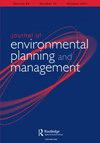Smallholder farmers’ climate change cognition, adaptation practices and perceived adaptation efficacy in the Yangtze River Basin, China
IF 3.6
4区 经济学
Q1 DEVELOPMENT STUDIES
Journal of Environmental Planning and Management
Pub Date : 2023-10-24
DOI:10.1080/09640568.2023.2269474
引用次数: 0
Abstract
AbstractClimate change adaptation is a dynamic process that involves prior cognition, actual action, and subsequent perceived efficacy. However, few studies have focused on whether measures influence perceived adaptation efficacy or even provided comprehensive conceptualizations of the links among cognition, behaviors, and efficacy. This study developed an integrated conceptual framework and employed econometric models to determine their influencing relationships using household survey data from the Yangtze River Basin of China. Our findings reveal that farmers perceive that they maintain negative risk and adaptation cognition, although they have high perceived adaptation efficacy. Most importantly, climate change cognition has significant impacts on six kinds of adaptation practices. Perceived adaptation efficacies are only positively influenced by agro-technical management, agro-environmental improvement, financial support, and external help. Crop adjustment lowers land adaptation efficacy, and livelihood transformation reduces the efficacy of family, crop, and land. Corresponding policy recommendations are made to help improve targeted and dynamic adaptation capacity. Our ideas and findings may be complementary to existing research and easily repeatable for future investigations about climate change adaptation worldwide.Keywords: Climate change cognitionadaptation practicesperceived adaptation efficacyadaptation capacityYangtze River Basin AcknowledgementsWe appreciate all the participants for their cooperation. We are grateful to the editor and anonymous reviewers for their insightful comments and suggestions, which have led to significant improvement of the early versions of the manuscript.Disclosure statementNo potential conflict of interest was reported by the author(s).Data availability statementThe data that support the findings of this study are available on request from the corresponding author.Additional informationFundingThis work was supported by the National Natural Science Foundation of China (Grant number 42271203) and the Second Tibetan Plateau Scientific Expedition and Research Program (Grant number 2019QZKK0608).长江流域小农气候变化认知、适应实践与感知适应效能
摘要气候变化适应是一个动态的过程,包括前期认知、实际行动和后续感知效果。然而,很少有研究关注措施是否影响感知适应效能,甚至对认知、行为和效能之间的联系提供全面的概念化。本研究利用长江流域入户调查数据,构建了一个完整的概念框架,并运用计量经济模型来确定二者的影响关系。研究结果表明,尽管农民具有较高的感知适应效能,但他们仍然保持着负风险和适应认知。最重要的是,气候变化认知对六种适应实践具有显著影响。感知适应效应仅受到农业技术管理、农业环境改善、财政支持和外部帮助的积极影响。作物调整降低了土地适应效率,生计转型降低了家庭、作物和土地的适应效率。提出了相应的政策建议,以帮助提高有针对性的动态适应能力。我们的想法和发现可能是对现有研究的补充,并且很容易在未来对全球气候变化适应的调查中重复。关键词:气候变化认知适应实践感知适应效能适应能力长江流域感谢各方的合作。我们非常感谢编辑和匿名审稿人提出的有见地的意见和建议,这些意见和建议使早期版本的手稿有了很大的改进。披露声明作者未报告潜在的利益冲突。数据可用性声明支持本研究结果的数据可根据通讯作者的要求提供。基金资助:国家自然科学基金(批准号42271203)和青藏高原第二次科学考察与研究计划(批准号2019QZKK0608)。
本文章由计算机程序翻译,如有差异,请以英文原文为准。
求助全文
约1分钟内获得全文
求助全文
来源期刊
CiteScore
9.10
自引率
5.10%
发文量
155
期刊介绍:
Journal of Environmental Planning and Management has already established itself as a leading forum for up-to-date scholarly but accessible papers on all aspects of environmental planning and management. With contributions from leading international authors, the Journal publishes influential, high quality papers -an essential feature whether you are a subscriber, reader, contributor or all three. The Editors and International Editorial Advisory Board are drawn from around the world and are committed to encouraging researchers and practitioners to contribute to multidisciplinary and international debate in the field. The central aim is to focus on the integrated planning and management of the environment.

 求助内容:
求助内容: 应助结果提醒方式:
应助结果提醒方式:


